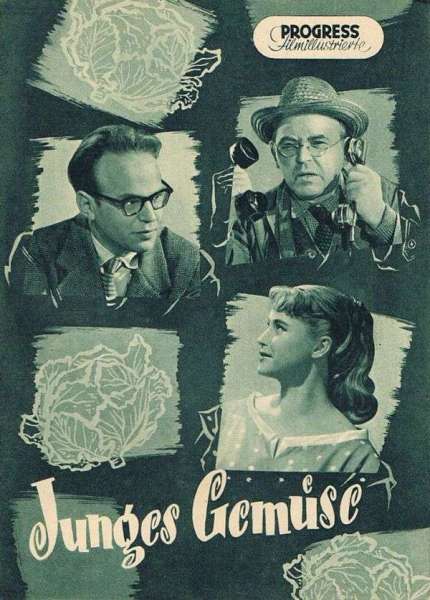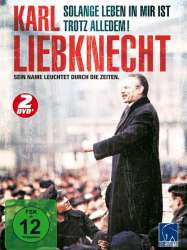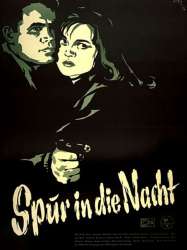Junges Gemüse is a film of genre Drama directed by Günter Reisch with Norbert Christian
Junges Gemüse (1956)

If you like this film, let us know!
Directed by Günter Reisch
Junges Gemüse is an East German film. It was released in 1956.
Actors

Norbert Christian
(Dramaturg)
Comments
Leave comment :
Suggestions of similar film to Junges Gemüse
There are 0 films with the same actors, 13 films with the same director, 87118 with the same cinematographic genres (including 11844 with exactly the same 2 genres than Junges Gemüse), to have finally 70 suggestions of similar films.If you liked Junges Gemüse, you will probably like those similar films :

The Punch Bowl (1959)
, 1h30Directed by Günter Reisch
Genres Drama, Comedy, Musical
Themes Musical films
Actors Christel Bodenstein, Albert Hetterle, Erika Dunkelmann, Fritz Diez, Jürgen Holtz
Wilhelm Lehmann is informed that he will receive the Order of the Banner of Labor on his sixty-fifth birthday, for being the best worker in the most successful chemical plant in the country. However, it is soon made clear that all his grown up children have other plans for the day, and none of them can arrive to honor their father and their mother Auguste. But, after a series of comical mistakes that lead to utter pandemonium, all the sons and daughters eventually appear to greet Wilhelm as he is awarded the Order. The whole family drinks the traditional May wine, as they have done in every year.

A Lively Christmas Eve (1962)
, 1h34Directed by Günter Reisch
Genres Drama, Comedy
Themes Christmas films
Actors Erwin Geschonneck, Horst Giese, Jutta Wachowiak
Rating59%





Dresden, Christmas Eve. Veteran communist and factory director Walter Lörke is told by his daughter Anne that she became pregnant by a young man named Thomas Ostermann, whom she intends to marry. Thomas is revealed to be a sharp critic of the government. Enraged, Walter leaves the house. Outside, he begins to inquire about his would-be son-in-law. After a clumsy voyage in the streets of the city, during which he encounters many absurd phenomena, he discovers that Thomas had a friend whose parents escaped to West Germany. The friend was ostracized by society, but Thomas did not shun him, and was therefore barred from entering university. Walter returns home and talks to Thomas, who realizes that although he suffered injustices, he remains true to the ideals of the party. The two reconcile.

Anton the Magician (1978)
, 1h46Directed by Günter Reisch
Genres Drama, Comedy, Romance
Actors Ulrich Thein, Erwin Geschonneck, Anna Dymna, Barbara Dittus, Leon Niemczyk, Grigore Grigoriu
Rating65%





 , 1h54
, 1h54Directed by Günter Reisch
Genres Drama, Biography, Historical
Themes Politique, Political films
Actors Mikhaïl Oulianov, Albert Hetterle, Jutta Hoffmann, Erika Dunkelmann, Zofia Mrozowska, Siegfried Weiss
Rating72%





 , 1h54
, 1h54Directed by Günter Reisch
Genres Drama
Themes Political films
Actors Albert Hetterle, Erika Dunkelmann, Siegfried Weiss, Hans Finohr, Adolf Fischer, Werner Dissel
Rating72%





The film opens in Berlin in 1914, as Germany is preparing for World War I. Liebknecht (Schulze) receives a call from a fellow lawyer and revolutionary, Mr. Rauch, that documents have been found proving the German heavy arms industry's secret involvement in the buildup to the war. He brings these documents to a meeting of the Reichstag, accusing Gustav Krupp and his company of bribing officials to release military secrets. In addition to this, Krupp and his company wrote to ask the French media to state that the French military has twice as much artillery as they actually possess so that they may provoke a surge in militarism. Afterward, while celebrating a friend's wedding, Liebknecht learns of the assassination of Archduke Franz Ferdinand, recognizing that this is the war the German imperialists were seeking. However, the resources for war still need to be approved. Liebknecht immediately begins campaigning among the public, denouncing the war as a means to secure profit for the capitalists. In an SPD party meeting, Liebknecht is one of only fourteen members to vote against the war credits. In the subsequent Reichstag meeting, he votes with the party discipline in favor of the war credits, to the public's surprise. He announces in the party meetings that he will no longer yield to party discipline and will stand by his anti-militarist principles even if the party leadership will not do the same. Liebknecht is the only one of the Reichstag — including 111 SPD representatives — to vote against the war loans, resulting in a number of death threats and work bans. Despite his immunity as a Reichstag member, Liebknecht is called to serve on the front as a sapper. It is here that he writes his 1915 manifesto, "The main enemy is at home!" The manifesto is passed among his fellow soldiers on the front before returning home. While he is away, Paul Schreiner, whose wedding Liebknecht attended earlier in the film, dies on the front. This leaves his wife Käthe to raise their newborn child alone and make Liebknecht's manifesto public.

The Sailor’s Song (1958)
, 2h6Directed by Kurt Maetzig, Günter Reisch
Genres Drama, Historical
Themes Seafaring films, Transport films, Political films
Actors Günther Simon, Raimund Schelcher, Ulrich Thein, Hilmar Thate, Siegfried Weiss, Hans Finohr
Rating62%





As the news of the October Revolution sweep through the world, the German High Seas Fleet's command, wary of a mutiny, decides to send all its ships to a suicide mission in the English Channel. Sailors Albin Köbis and Max Reichpietsch are sentenced to death for political activity. When the socialist sailor Steigert, a member of the firing detail, cannot bring himself to shoot them, he is arrested. On the cruiser Prince Heinrich, Steigert's friends Lenz, Lobke, Kasten and Bartuschek receive Vladimir Lenin's transmit to all of mankind calling for peace. Slowly, the sailors in Kiel — all members of different socialist parties: the Social Democrats, the Independent Socialists and the Spartakists — begin to realize the need for a revolution. The workers and the shipmates rebel against the officers, but the political gaps between them lead the uprising to a failure. In the end, many of the rebel sailors attend the foundation conference of the new Communist Party of Germany.

New Year’s Eve Punch (1960)
, 1h31Directed by Günter Reisch
Genres Comedy, Musical
Themes Musical films
Actors Erika Dunkelmann, Christel Bodenstein, Alfred Müller
Rating51%






A Lord of Alexander Square (1967)
Directed by Günter Reisch
Genres Comedy
Actors Erwin Geschonneck, Sabine Thalbach, Carola Braunbock, Armin Mueller-Stahl, Angelica Domröse, Erika Dunkelmann
Rating65%






Maiden, You please Me (1969)
Directed by Günter Reisch
Genres Comedy, Historical
Actors Wolfgang Kieling, Winfried Glatzeder, Michael Gwisdek
Rating67%






The Track in the Night (1957)
Directed by Günter Reisch
Genres Drama, Crime
Actors Ulrich Thein, Raimund Schelcher, Annekathrin Bürger, Friedrich Gnaß, Albert Hetterle
 Connection
Connection